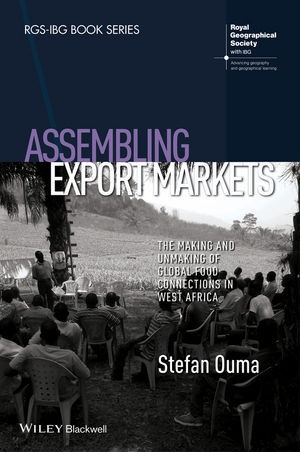Read more
Assembling Export Markets explores the new 'frontier regions' of the global fresh produce market that has emerged in Ghana over the past decade.
List of contents
Series Editors' Preface viii
Preface ix
Technical Remarks xi
List of Figures xii
List of Tables xiii
Abbreviations xiv
1 Introduction: Struggling with "World Market Integration" 1
Rethinking Global Connections 6
Grounding Commodity Chains: Geographies of Marketization 9
Matters of Concern 14
The Practical Means of Marketization 15
Marketization as Proliferation 16
Of Frontier Regions and Borderlands 16
How This Book Unfolds 17
2 Querying Marketization 21
Studying Markets as Practical Accomplishments 23
Markets as Sociotechnical Agencements 25
"Problems" of Market?]Making 29
Exchanging Goods the "Right" Way 31
Qualified Objectifications 32
Detachment/Calculation 35
Singularizations 36
Knowing and Doing Markets 37
From Market Knowledge to Knowing Markets 38
Power in/through Markets 39
Formatting Market Encounters 42
The Order(ing) of Markets 44
Conclusion 49
3 Remaking "the Economy": Taking Ghanaian Horticulture to Global Markets 53
Models of Organizing "the Economy": From Macro to Micro 56
A Tale of Two Frontiers 59
Markets for Development: Organic Mangoes in Northern Ghana 60
Fresh from Farm: JIT Pineapple Markets 66
Sites of Attention 71
Conclusion 74
4 Critical Ethnographies of Marketization 77
Researching Markets in the Making 79
Outside/Inside "the Market" 81
"Reconstructing" Market Practices 85
Technicalities? 86
Knowledge Production: Heuristics and Limitations 88
After "the Field": Veni, Vidi, Vici? 90
Conclusion 92
5 The Birth of Global Agrifood Market Connections 94
Nothing Was Packaged for (High?]value) Export 97
Market Enrollment, Not Integration 98
The Messy Economics of Outgrowing 107
Market?]making as Boundary Work 108
Outflanking Nature? 113
The Terms of "World Market" Enrollment 115
Good(s) Connect(ions) 119
Having the "Right" Product 121
Performing the Audit Economy 122
Relational Properties of Competition 123
Ongoing Struggles for Retail Worth 124
The Orderings of JIT 125
Conclusion 126
6 Enacting Global Connections: The Making of World Market Agencies 131
Qualculating the Mango Tree 133
Indeterminate Framings of Worth 133
Struggling for the Agricola Oeconomicus 137
Responsibilizing/Autonomizing Farmers 140
Standardizing Market STAs 141
Standards and the Stubborn Social 147
Value/Power 149
Conclusion 151
7 Markets, Materiality, and (Anti?])Political Encounters 153
The Hidden Conditions of Global Markets 155
Powerful Valorimeters 157
Pricing, Returns, and Visible hands 159
Power Relations as Relations of Accounting 162
Accounting: Frontstage 165
Accounting: Backstage 166
Conclusion 171
8 Market Crises: When Things Fall Apart, or Won't Come Together 174
A Model in Crisis 177
MD2 Takes Over the Market, or How Goods Become Delegitimated 178
Trading Down in Times of Crisis 183
Currency and Capital Volatilities 183
When the Supply Base Disenrolls ... 184
Reassembling the Market Social? 187
Recalcitrant "Nature" and the Crisis of the Developmental Market 189
(Mis?])calcul
About the author
Stefan Ouma is Assistant Professor in the Department of Human Geography at the Goethe University of Frankfurt. Being an economic geographer by training, he has worked extensively on global commodity chains, agrifood standards, smallholder agriculture, and contract farming in East and West Africa.
Summary
Assembling Export Markets explores the new frontier regions of the global fresh produce market that has emerged in Ghana over the past decade.
Report
'In transparently clear prose, Stefan Ouma has written awonderfully rich empirical account of how global markets fortropical fruit are made both materially and institutionally at theintersection of very particular local sites. The book is anotherterrific example of the usefulness of the theory of economicperformativity that German economic geographers have increasinglyhoned and made their own.'
-- Trevor Barnes, Department of Geography, University ofBritish Columbia
'In this provocative book, Ouma challenges theconventional wisdom of both market enthusiasts and critics. Throughinsights from across the social sciences, he shows how both marketinstitutions and the persons who perform them always emerge fromparticular messy historical circumstances, creating differentformats and distributions of power in different locations.Ouma's 'on the ground' study offers a new andimportant approach to understanding markets.'
-- Lawrence Busch, Department of Sociology, Michigan StateUniversity

